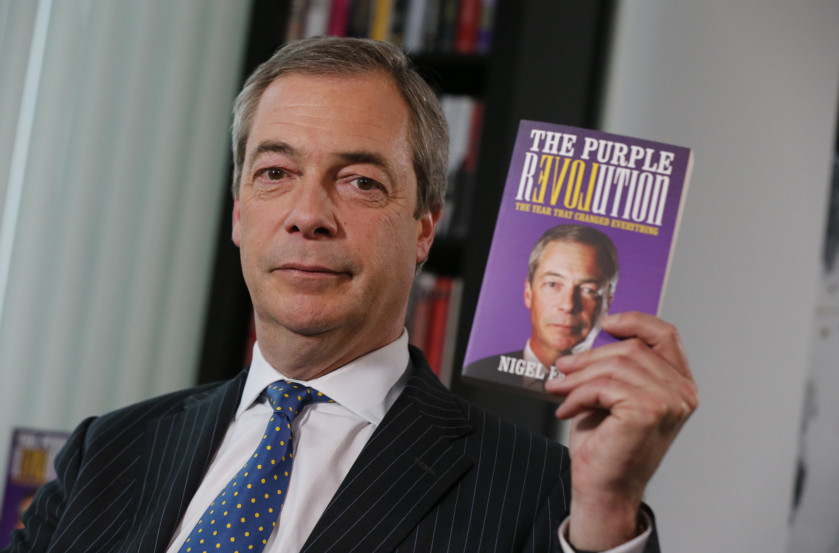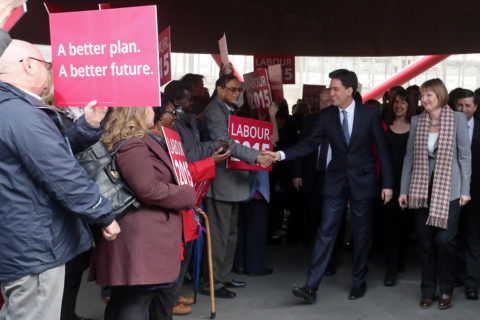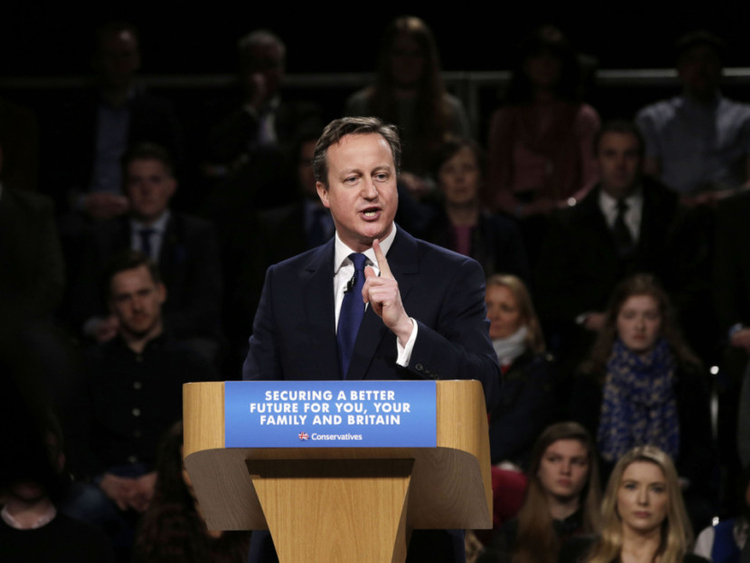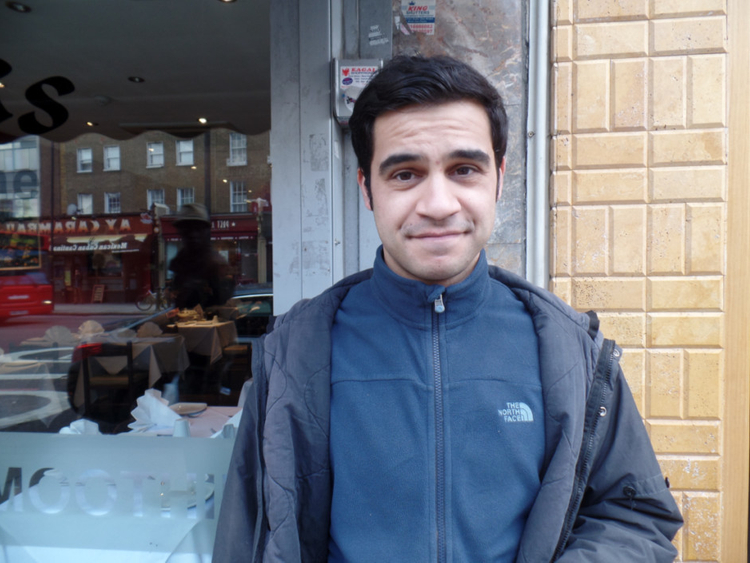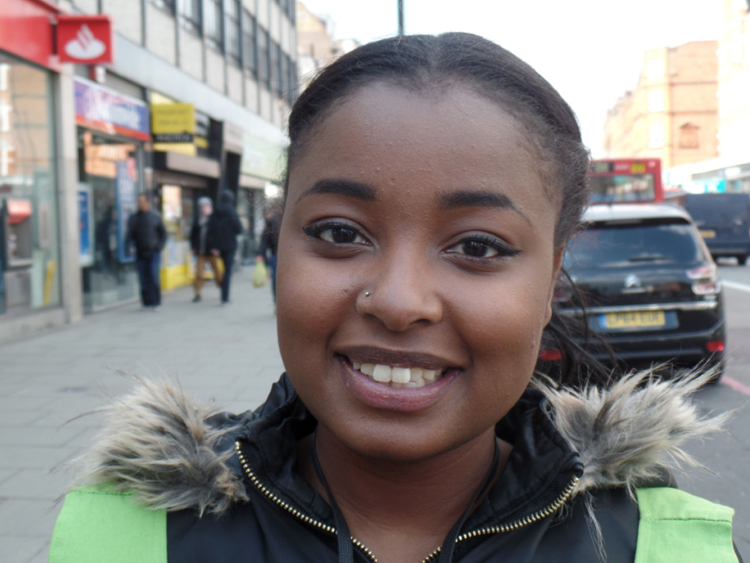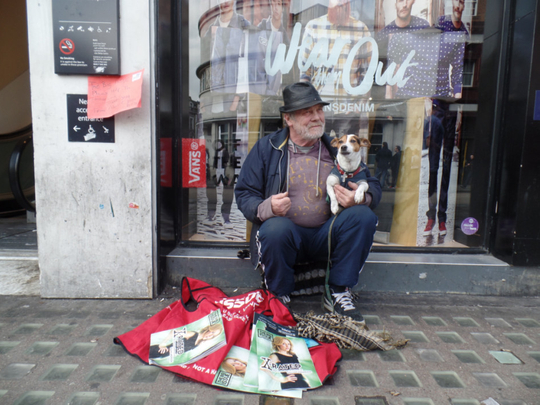
It is a cloudy and cool afternoon in Camden Town, London. The air is filled with the sound of music as three young street artistes play their instruments near the exit of a busy tube station. A small crowd is gathered watching. Two policemen in florescent jackets can be seen patrolling close by. Busy shoppers and tourists are walking. Occasional joggers find their way through the road crossings as they head towards Regents Park.
Opposite the Camden Town tube station sits 67-year-old Alex Lea. Spread out in front of him are copies of The Big Issue, a magazine sold in the United Kingdom by homeless and long-term unemployed people to help make a living.
Lea smiles as he watches passersby getting on with their busy lives. Behind the smile, however, is a man who isn’t very happy with the way the country is run. When he is asked about whether he will vote in the upcoming general elections in May the frustration comes to the surface. “I am born in England,” he says. “I am 67 years old and I am selling The Big Issue you know? No offence but there are too many foreigners. The gates are open for anybody to come into this country.”
Lea’s concerns on immigration aren’t just the complaints of a lonely street vendor. According to a recent poll by research firm IPSOS/MORI some 45 per cent respondents consider immigration the top concern ahead of the elections on May 7.
“Once whoever gets in they can promise you this, promise you that, but you get nothing,” Lee says. “I mean I want a job and they never give me one. They keep saying I am going to give you one. I have been doing this for 18 years, The Big Issue, you know. Here, this spot. 18 years. They won’t give me a job.” Unemployment, healthcare and the economy are also key issues.
The upcoming elections are different to previous elections in the UK. Traditionally elections have largely been a two way contest between the Conservatives and Labour. This time round there is more uncertainty with the rise of the Scottish National Party (SNP) in the north. The party lost a referendum to gain independence for Scotland last year but has experienced a steady rise in popularity.
Also in the news have been the UK Independence Party (UKIP), which campaigns for more controls on immigration and exiting the European Union (EU).
The emergence of UKIP is a reflection of “xenophobia, a reflection of racism and a reflection of the European wide xenophobic movement”, says Labour Party MP Jeremy Corbyn. “When they are challenged their arguments quickly unravel.” Corbyn represents Islington North, London, a seat he has held since 1983.
He acknowledges how the main two parties have been losing support. “There has been a fairly consistent decline of support for both parties as a proportion of the total overall over a long period,” he says. “In 1951, for example, 90 per cent of the electorate voted either Labour or Conservative. And that figure is now between 60-65 per cent of those who intend to vote for either of the two main parties.”
That decline is reflected in success of the SNP in Scotland which has traditionally been a Labour stronghold. “In the past you would expect Scotland just to deliver pretty much a block vote for Labour,” says Richard Walker, editor of Scottish newspapers The National and Sunday Herald. “And I think in the recent Holyrood elections the SNP have attracted increasingly more votes. The referendum has changed a lot in Scotland.”
Voters in Scotland face many of the same issues as the rest of the UK. However they also have some unique concerns. “People in Scotland are looking for more powers for the Scottish parliament,” says Walker. “ I think they see a way of making sure that they can get those by voting SNP.”
If no party gets a majority then the SNP could end up playing a very significant role in who gets to from a government. “Yes there is a very good chance they will end up as kingmakers,” says Gerry Hassan, an author, academic and prominent commentator on Scottish politics. “That raises the stakes massively. So there is big opportunities and big threats in it for you when you enter that role.”
Hassan is author of numerous books which include “The Strange Death of Labour Scotland”, “The Modern SNP: From Protest to Power” and “Dreaming: The Quest for a Different Scotland”. He explains that while a coalition between the SNP and Labour looks unlikely, there are other ways to reach an agreement. “Coalition is different to making a deal. And there is different kinds of deals. So coalition involve government ministers sitting in the same cabinet and agreeing to a legislative programme. Tax and spend. That is not going to happen between Labour and the SNP. And it is in no one’s interest that it would happen.”
As the SNP only run their candidates in Scotland, forming a coalition in a national government would not make sense. Labour leader Ed Miliband has also ruled out a coalition with the SNP.
However, former First Minister Alex Salmond, who is running for a seat in Westminster, has pledged to vote down any Tory minority government. This could then lead to Labour forming a government. “I think anything that stop Tories from forming a government is to be welcomed,” says Jeremy Corbyn.“I do not want Labour to go into coalition with anybody. I would rather we formed a minority government and [held] a debate on each issue as it comes up. And I think that would make for a very interesting parliament. It might actually be a more effective parliament in holding government to account.
It is also somewhat confusing, especially if you live in Scotland. Some may wonder whether voting for the SNP isn’t just helping bring a Labour government to power? “Well I am not sure how that argument is sticking to be honest,” says Walker. “I mean Scotland has voted Labour and have ended up with Conservative governments. So you can say that in past elections Scotland has not got the government it has voted for on many occasions. So I am not sure we believe that if we vote Labour we will get a Labour government.”
One under-reported area of the elections is foreign policy and how it features among the different parties. “Foreign policy doesn’t normally dominate elections in Britain,” says Corbyn. “I wish it did. I am passionately opposed to nuclear weapons and I am completely opposed to the Iraq war and the intervention strategy. I am a minority in that both in parliament and to a less extent in my own party.”
He talks about human rights and the Tories poor record in that department. “Labour voted for the recognition of Palestine when the vote came up [last year.] And Labour is committed to a lot more work on development and human rights [than the Conservatives],” says Corbyn.
More intriguing is the SNP’s stance on foreign policy matters. “The SNP’s foreign policy, well there is a couple of things that is different,” says Hassan. “One is they are 100 per cent against spending the £100 billion (Dh545 billion) on Trident nuclear missiles. One of their red lines on any discussions on voting on any kind of government in any way is no renewal of Trident.”
The nuclear weapons programme is very unpopular in Scotland. One recent YouGov Poll showed that nearly half of Scots were in favour of Britain scrapping its nuclear weapons.
“The party is for staying in Nato which is obviously what the United Kingdom aims,” says Hassan. “In terms of being a small country Scotland’s foreign policy would be humbler and more multinational then the United Kingdom foreign policy has tended to be.”
“And yes, with things in the Middle East it would be a kind of more even handed, and in that kind of less automatically pro-Israeli stance.” Hassan says the SNP’s foreign policy would be more nuanced, like certain small European countries. “Building an alliance with people to do things in the Middle East and elsewhere rather than thinking we can do things just with the Americans.” Interestingly the UKIP has been struggling to make inroads in Scotland. Hassan points to different factors to explain why UKIP hasn’t done so well. “Scotland is more pro-European than the rest of UK, but you wouldn’t want to over emphasise that point,” he says “It is also just things such as Scotland has a more centre-left politics because we have Labour and the SNP. But again you would not want to over emphasise that. You have also got the fact that you have four main parties in Scotland which is more than in England. Then you have the Greens which you have for a while. And so it is a crowded political market.”
Although the SNP did not get the majority for a yes vote in the independence referendum last year, a recent poll showed 69 per cent Scots believe Scotland will leave the United Kingdom. But independence isn’t what’s on the table in these elections.
“These elections have got nothing to do with independence,” says Walker. “Whether or not it has any impact on the long term aim to get independence remains to be seen. I mean I think there is a growth in support for independence. And I think at some point people in Scotland would be wanting to have another referendum. This election isn’t that.”
For many ordinary voters in the UK the immediate concerns are the more pressing everyday issues. One first-time voter is 19-year-old Londoner Tania Gomez who works for a charity. She isn’t sure she will vote but if she does it will likely be Labour.
“People are sick of the Conservatives,” she says. “Absolutely sick of the Conservatives. Conservatives by themselves will not win.” She says that the Tory party only appeals to the upper class “bourgeoisie”.
However not everyone thinks they deserve to be booted from power. Michael Vallantine works as an electrician. The 30 year old reckons he will “probably” vote for the Tories. “They need to stick with what they are doing,” he says. The last time Vallantine voted was when he was 18. At that time he cast his ballot for Labour. “With Labour it was like the benefit system how it went just a bit too much the other way. It seems to benefit people not really doing much.”
As for the The Big Issue seller Alex Lea, he revealed that he voted for the Conservatives in the last election. However, he expresses disapproval when asked about their performance over the past four years in power. “[They are all] the same,” he says in a dejected tone. “You can’t do much about it. What can you do? I wish you could do something about it. Sorry man I am messin up.”
After venting his anger at the politicians for a few minutes, Lea returns to selling his magazines. He puts one arm around his companion dog as the occasional passerby stops to buy a copy. On the opposite side of the street the crowd listening to the music is applauding. Elections maybe only a few weeks away, but not everyone is bothered.
Syed Hamad Ali is a writer based in London.



